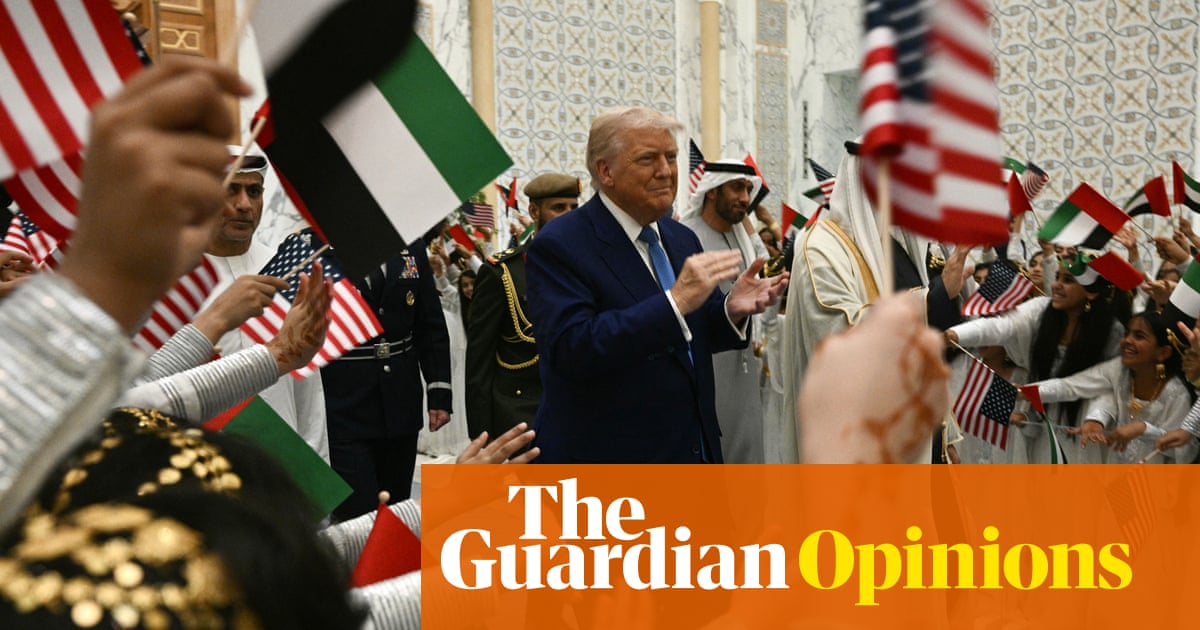Donald Trump’s visit to the Middle East last week was an exercise in disorientation. Both in terms of rebalancing the relationship between the US and the region, and in scrambling perceptions. In Riyadh, he told the Saudi royals there would be no more “lectures on how to live”. He lifted sanctions on Syria so that the country may have a “fresh start”, and hefawned over the camelsand lavish architecture (“as a construction guy,”he said at one Qatari palace, “this is perfect marble”). Never has Trump appeared more in his element, surrounded by the wealth of sovereigns, the marshalling power of absolute monarchies, and their calculated self-orientalisation and over-the-top flattery.
The same man who enacted the Muslim ban in his first term wasstrolling around mosquesandshrugging off the radical path to powerof the Syrian president: “Handsome guy … Tough past, but are you gonna put a choir boy in that position?” His call for recognising the new role of Gulf states both as political and economic powerhouses, and matter-of-factly taking their lead on what Syria needs right now, whatever the history, is excruciating. Because it reveals how painfully sclerotic and inconsistent previous administrations were. Joe Biden promised to take a hard line with the Saudi government for its role in the murder of Jamal Khashoggi and in the Yemen war, and then seemed toforget about it, or realised he couldn’t follow through. From Trump, there is no such mixed signalling: you are rich, we need you. You do you.
The Democrats lectured while abjectly failing to enforce the standards of international law. Trump is dispensing with the pretence of international law altogether, and in doing so ending the theatre that the US was ever some virtuous protagonist in the region. The result is a transactionalism of equals, thebillion dollar dealsand quid pro quos cut in plain sight. For the three Gulf countries that Trump visited, Qatar, the UAE and Saudi Arabia, Trump’s recognition of their colossal national projects in economic transformation, and political positioning in terms of foreign policy, slaked an appetite to be seen. To be acknowledged not just as wealthy ignoramuses to be managed, but sophisticated power brokers in their own right.
There is a particular brand, that is still being finessed, of shaping politics in the region and diversifying from natural resources. Take the UAE’s financing of adevastating war in Sudanin order to get a foothold on the African continent, and, at the other end of the spectrum, Qatar’s quiet emergence as thenegotiating capital of the world.
What is clear is that the centre of gravity is shifting for the US away from European capitals and transatlantic alliances, towards a region that, as far as Trump is concerned, is not bothering him with any moral condemnations on Ukraine, doesn’t have the pesky matter of a voting public to worry about, and has spare billions to invest and flamboyantly flatter. Keir Starmer can have a good stab at getting Trump on side by offering a “historic” royal invitation for a state visit, but can heproject the stars and stripeson the world’s tallest building?
But there is a fundamental disjuncture to Trump’s trip that was apparent in parts of Middle Eastern state media and political pronouncements last week. As Israel intensified its strikes in Gaza, signifying its lack of interest in negotiating any meaningful ceasefire, there was arising clamourin condemnation of the assault. As Trump was received with US flag waving, one stark issue could not be broached – that he leads the country that is supplying the weapons and political support for a military campaign that is destabilising the region.
It was a disconnect that characterised the entire trip. Among all the emphatic language and imagery of a bloc of rising powers, the question remained of what exactly that power could be used for. Is it purely one that gives these states the right to supercharge their economies through more favourable trading relationships with the US? And gives them licence to pursue foreign policy escapades and projects on their own turf without fear of censure or “lecturing”? Or is it power that can be wielded to meaningfully influence political outcomes and persuade the US to change course on Israel-Palestine, an issue that now lies at the heart of not only Middle Eastern but Arab politics.
The war has now extended to Lebanon and Syria, Jordan and Egypt are under extreme pressure, and even in ostensibly unchallenged monarchies, it is a public opinion and PR hot potato that needs to be handled very carefully. Trump is still shopping his ethnic cleansing plan that aims to “resettle” people from Gaza,this time to Libya, and the momentum of the early days of his administration to secure a ceasefire is now gone, as Israel intensifies its campaign tooccupy more parts of Gaza. As lavish scenes unfolded across the Gulf, and Trump commented on the quality of marble, there was one unavoidable thought – no food, water or medicinehas been allowed into Gaza for months.
The question of the limits of this new US deference is crucial in correctly estimating what just happened. Because even though it looked as if something historic took place, that Trump had blown away the cobwebs of old foreign policy in the region, broken with orthodoxies, and made overtures that overturn decades-old tropes and perceptions, it may all still come to nothing where it matters most. If these forces still have no ability to dictate what happens in their own back yards, no ability to stabilise and determine the region’s political future, or indeed, assume the mantle of leadership in which they have the power and responsibility to save other Arabs from hunger, displacement and bullying, then it’s all elaborate theatre with a measure of economic windfall. No lecturing is nice, but being the master of your own fate is all that really matters.
Nesrine Malik is a Guardian columnist
